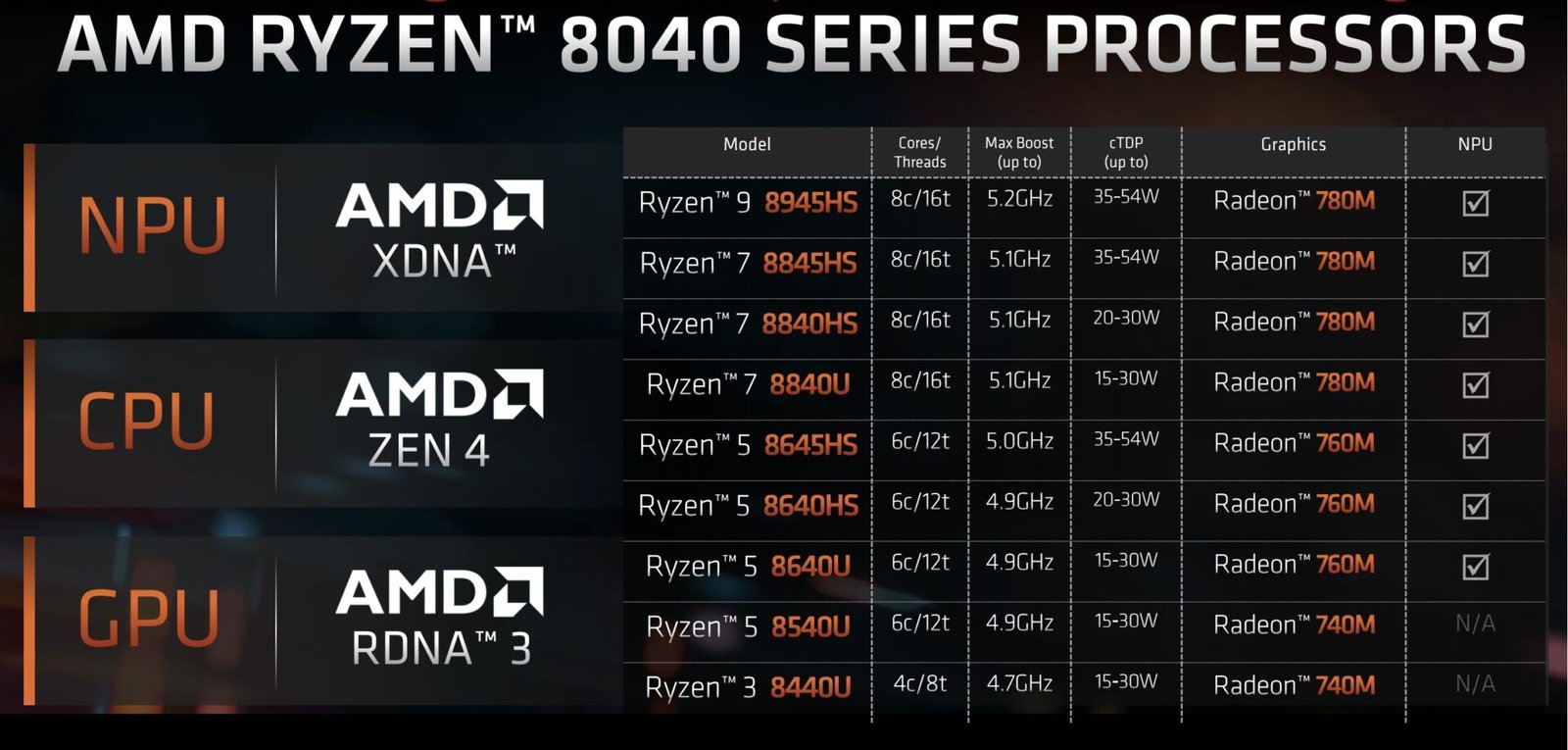Last January, AMD beat out Intel by launching its Ryzen 7040 chips, the first x86 processors to integrate a neural processing unit (NPU) for AI workloads. Intel's long-delayed Core Ultra "Meteor Lake" chips, its first to integrate an NPU, are set to arrive on December 14th. But it seems AMD can't help but remind Intel it's lagging behind: Today, AMD is announcing the Ryzen 8040 series chips, its next batch of AI-equipped laptop hardware, and it's also giving us a peak into its future AI roadmap.
The Ryzen 8040 chips, spearheaded by the 8-core Ryzen 9 8945HS, are up to 1.4 times faster than its predecessors when its comes to Llama 2 and AI vision model performance, according to AMD. They're also reportedly up to 1.8 times faster than Intel's high-end 13900H chip when it comes to gaming, and 1.4 times faster for content creation. Of course, the real test will be comparing them to Intel's new Core Ultra chips, which weren't available for AMD to benchmark.
AMD's NPU will be available on all of the Ryzen 8040 chips except for the two low-end models, the six-core Ryzen 5 8540U and the quad-core Ryzen 3 8440U. The company says the Ryzen 7040's NPU, AMD XDNA, is capable of reaching 10 TOPS (tera operations per second), while the 8040's NPU can hit 16 TOPS. Looking further into 2024, AMD also teased its next NPU architecture, codenamed "Strix Point," which will offer "more than 3x generative AI NPU performance." Basically, don't expect AMD to slow down its AI ambitions anytime soon.
It's worth remembering that both AMD and Intel are lagging behind Qualcomm when it comes to bringing NPUs to Windows PCs. Its SQ3 powered the ill-fated Surface Pro 9 5G. That was just a minor win for the Snapdragon maker, though: the Windows-on-Arm experience is still a mess, especially when it comes to running older apps that require x86 emulation.
The far more compelling competitor for Intel and AMD is Apple, which has been integrating Neural Engines in its hardware since the A11 Bionic debuted in 2017, and has made them a core component in the Apple Silicon chips for Macs. Apple's Neural Engine speeds up AI tasks, just like AMD and Intel's NPUs, and it helps tackle things like Face ID and photo processing. On PCs, NPUs enable features like Windows 11's Studio Effects in video chats, which can blur your background or help maintain eye contact.
Just like Intel, AMD is also pushing developers to build NPU features into their apps. Today, it's also unveiling the Ryzen AI Software platform, which will allow developers to take pre-trained AI models and optimize them to run on Ryzen AI hardware. AMD's platform will also help those models run on Intel's NPUs, similar to how Intel's AI development tools will ultimately help Ryzen systems. We're still in the early days of seeing how devs will take advantage of NPUs, but hopefully AMD and Intel's competitive streak will help deliver genuinely helpful AI-powered apps soon.
This article originally appeared on Engadget at https://www.engadget.com/amds-ryzen-8040-chips-remind-intel-its-falling-behind-in-ai-pcs-200043544.html?src=rss
Source link

